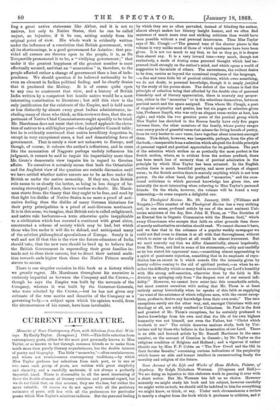CURRENT LITERATURE.
Memories of Some Contemporary Poets, with Selections from their Writ- ings. By Emily Taylor. (Longman.) 1868.—This little selection from contemporary poets, either for the most part personally known to Miss Taylor, or so known to her through common friends as to make them much more than purely literary acquaintances, has the double interest of poetry and biography. The little "memories,"—often reminiscences, and where not reminiscences contemporary traditions,—by which Miss Taylor prefaces her selections from each poet, or in one or two cases each group of poets, are written with great simplicity and sincerity, and a carefully moderate, if not always a perfectly impartial, hand. There is discernible in all the most interesting of these the double element of literary criticism and personal regard, but we do not think that, on that account, they are the less, but rather the more valuable. Of course we do not agree with all the prefatory estimates of poets, still less with all the preferences for particular poems which Miss Taylor's selections indicate. But the personal feeling
by which they are so often pervaded, instead of blinding the author, almost always makes her literary insight keener, and we often find sentences of much more true and striking criticism than would have been possible without a real personal intercourse. Thus Miss Taylor says of Mr. Clough :—" The general tone of the shorter pieces in the volume is very unlike most of those of which specimens have here been given. It is not too much to say that, so far as they go, it is deeper- than almost any. It is a very inward tone—very much, though not exclusively, a mode of hinting some personal thought which had im- pressed itself strongly on the author's mind, and which opens a world of suggestion to the minds of others. The earnestness, the evident desire to be true, carries us beyond the occasional roughness of the language, —a fine and terse little bit of poetical criticism, which owes something, we do not doubt, to personal knowledge, though it is amply justified by the study of the poems alone. The defect of the volume is that the principle of selection being that afforded by the double clue of personal friendship and of literary appreciation, there is scarcely any propor- tion, either in the "memories " or in the selections themselves, between poetical merit and the space assigned. Thus where Mr. Clough, a poet of singular originality and genius, has but six pages of selection given him, Professor Smyth, who was only an elegant verse-writer at best, has ; and while the two genuine poets of the poetical group which Miss Taylor has sketched in the Roscoe family have only five pages between them, the other members of the family, whose poetry ranges over every grade of graceful verse that misses the living breath of poetry, from its very border to mere verse, have together about nineteen amongst them. This defect, however, was inseparable, perhaps, from the plan of the book,—inseparable from a selection which adopted the double principle of personal regard and poetical appreciation for its guidance. The part of the selection which strikes us as poetically the most perfect is the Scotch section, where, as is evident from the notices prefixed, there has been much less of memory than of poetical admiration in the principle by which Miss Taylor has been actuated. In the English section there is much beautiful poetry, and more perhaps of elegant. verse ; in the Scotch section there is scarcely anything which is not true poetry. On the other hand, the prefixed " memories," and the occa- sional criticisms to which personal knowledge has given rise, are naturally the most interesting when referring to Miss Taylor's personal friends. On the whole, however, the volume will be found a very interesting,—in some respects a delightful one.






























 Previous page
Previous page